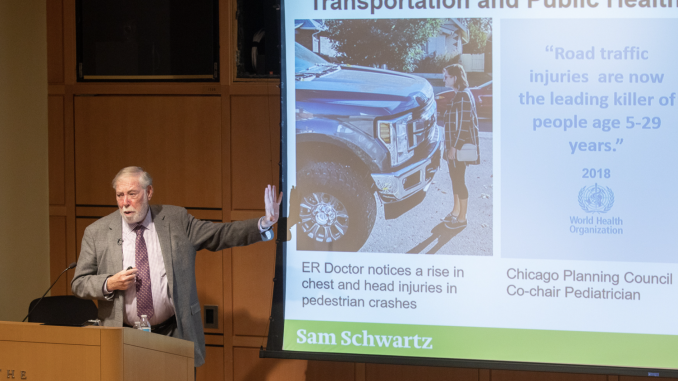
By Shlomie Katash
A grant from The Tow Foundation has allowed Brooklyn College to establish a five-part system to help build a culture of mentorship on campus. One of these parts, the Mentor-in-Residence program, had its first event on Oct. 19, bringing in CEO Sam Schwartz to talk about his research on the link between transportation and public health.
“What we’re doing with the Tow Mentor-in-Residence is we’re bringing high-profile senior scholars and practitioners to Brooklyn College to engage with students and faculty over the course of the semester,” said Professor Tammy Lewis from the Sociology Department in the talk’s opening remarks. “Mentors-in-Residence like Mr. Sam Schwartz are outstanding leaders not just in one field, but across various fields. There really are interdisciplinary thinkers.”
The talk was held in the Woody Tanger Auditorium in the BC Library and was open to both students and faculty, with around fifty people gathered to hear Schwartz speak.
Schwartz, who received a Bachelor of Arts in physics from Brooklyn College in 1969, is renowned in the world of traffic for his work over the past few decades. He’s currently CEO of Sam Schwartz Engineering, a firm that specializes in traffic management and engineering.
In the hour-long talk, Schwartz focused on the relationship between the increasing prevalence of cars and people’s health. Specifically, he examines the adverse impact cars have on people, whether it be air pollution, noise pollution, or outdoor noise caused by machinery that could be harmful, and more. He also discussed his research studying the link between COVID-19 and transportation, which concluded that contrary to initial claims and assumptions, public transportation had no impact on the spread of the virus.
“We looked at confirmed COVID-19 cases during the peak of the pandemic, we located them by zones, and we looked at public transit usage, car availability, and income levels, and we found some things that didn’t support what we were being told – that the subway is what’s contributing to COVID,” explained Schwartz.“The ten highest transit usage zones had a 31% lower case rate than the ten lowest zones. So, if transit was contributing to it, wouldn’t we have seen that?”
Beyond building a culture, the MIR program is looking toward building “a transformational experience” for those who participate. The organizers cited Schwartz’s own words, in which he described his time at Brooklyn College as “transformational” for his own career and as a model for every student on campus.
“I think it’s so great that Mr. Schwartz is our first speaker because he is an alum from 1969, and he credits Brooklyn College with much of his success. He had a transformational experience here,” said Professor Lewis. “So, I think he’s an exemplar of what we hope to produce through the Tow mentoring program.”
The MIR program hopes to do more than just bring in speakers. After the talk, Schwartz plans to visit different classes to give guest lectures and meet with faculty and students to answer any questions they may have – whether it’s about his career, research, or how they themselves can enter a career in traffic and transportation management.
